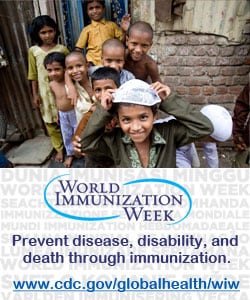Traveling to the Olympics this summer? Be careful what you bring back
Posted on by With the 2012 Summer Olympics less than 100 days away, people around the world are preparing. Athletes are putting in their final weeks of training, London officials are getting the city ready for visitors, and spectators are making travel plans. In CDC’s case, we’re trying to make sure everyone’s healthy for the big event.
With the 2012 Summer Olympics less than 100 days away, people around the world are preparing. Athletes are putting in their final weeks of training, London officials are getting the city ready for visitors, and spectators are making travel plans. In CDC’s case, we’re trying to make sure everyone’s healthy for the big event.
One area of concern is measles, in particular, unvaccinated travelers contracting measles while they’re abroad and bringing it back to the States. Last year, 222 people in the U.S. were reported to have measles—these cases were mostly due to overseas travel.
While traveling, you may be exposed to people from countries where measles is still common, including countries in Europe, Asia, the Pacific, and Africa. In 2011, over 30,000 people in Europe had measles. So, as you prepare for your trip abroad, make sure you’re protected against measles before you leave.
 Why are people still getting sick?
Why are people still getting sick?
Measles vaccination coverage in many countries around the world is not as high as in the United States and the Americas. Thanks to the vaccine, measles was declared eliminated in the U.S. in 2000. However, measles is still common worldwide—about 20 million people get measles each year. So, there’s a risk of being exposed to measles while you’re overseas.
Measles is highly contagious and very good at finding unvaccinated people. This includes babies who are too young to be vaccinated and people who have health conditions, like cancer. Measles spreads through the air when an infected person breaths, coughs, or sneezes. So, you can catch it just by being in a room where an infected person has been, even after they’re gone. You can be exposed in airports, airplanes, buses, hotels, or any place where there are infected people. You can even get measles from an infected person who doesn’t have measles rash yet.
If you’re not vaccinated, you put yourself and others at risk for measles and its complications, like pneumonia, encephalitis, or even death.
Luckily, the measles vaccine is highly effective. So, if you’re planning to travel overseas this summer, make sure you and your family are up to date on all vaccinations, including the measles vaccine. You can get more information about measles and the vaccine here: www.cdc.gov/measles.
When you travel, bring back memories, not measles!
4 comments on “Traveling to the Olympics this summer? Be careful what you bring back”
Comments listed below are posted by individuals not associated with CDC, unless otherwise stated. These comments do not represent the official views of CDC, and CDC does not guarantee that any information posted by individuals on this site is correct, and disclaims any liability for any loss or damage resulting from reliance on any such information. Read more about our comment policy ».



I like CDC so muchhhhh.
Thank you for the tips! So if you are traveling with a baby who is too young for vaccines, what countries do you recommend as the safest, or do you recommend waiting until they’ve had vaccines?
Regan P from USB Memory Direct
@Regan, we recommend talking with your pediatrician about when and what vaccines to give your child. You can learn more about international travel with infants and the recommended vaccines here: http://wwwnc.cdc.gov/travel/yellowbook/2012/chapter-7-international-travel-infants-children/vaccine-recommendations-for-infants-and-children.htm.
Hello — our toddler has received on dose of the MMR. The second dose if given prior to travel would be just a few days prior to the flight. It seems that only 2-5% do not become immune after the first dose. But that it is around 99% that do after the 2nd dose. The first dose takes between 2-6 weeks to go into effect. The question is what is the time table for the 2nd dose. For if it is at least 2 weeks to take effect –then we will be home before it takes effect!
(prefer to wait til age 4 due to other concerns -residual DNA etc–and I object to use of the aborted cell lines etc but have been forced to use this version-so have had not other choice)